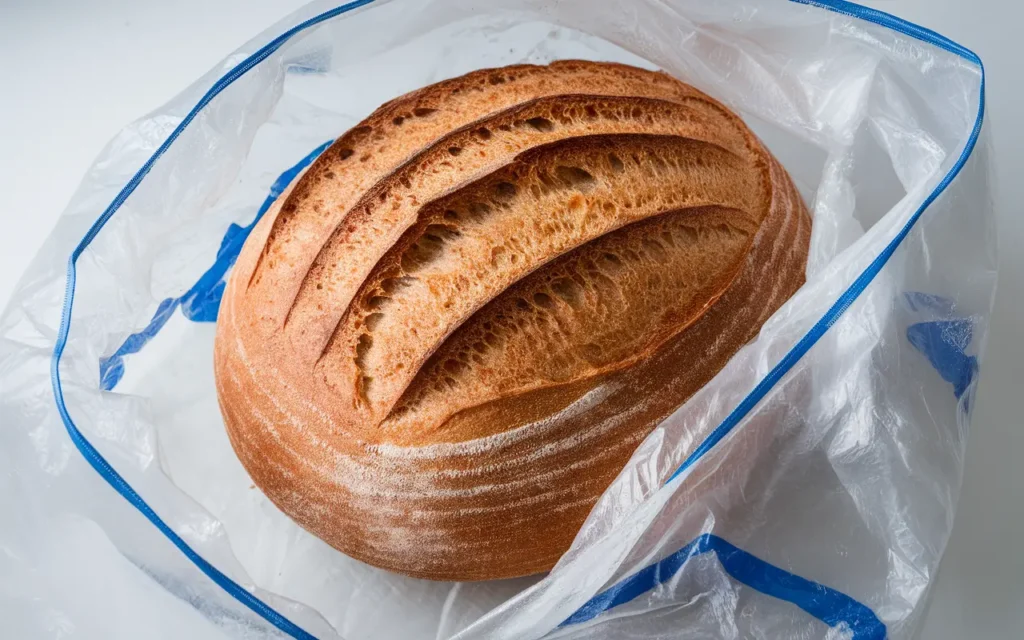Introduction to Freezing Sourdough Bread
Sourdough bread, with its tangy flavor and chewy texture, is a favorite for many bread enthusiasts. However, one common concern is how to extend its freshness and prevent waste. Can you freeze sourdough bread? Absolutely! Freezing is a practical solution for preserving the quality and taste of sourdough bread for longer periods.
Why Freezing Sourdough Is a Popular Option
Freezing sourdough bread has gained popularity for its convenience and effectiveness. Let’s explore why many choose this method over others.
Benefits of Freezing Sourdough
- Prolong Shelf Life
Freezing prevents spoilage and extends the usability of your sourdough bread, especially if you have a surplus. - Retain Freshness and Texture
Proper freezing techniques help retain the bread’s unique crust and crumb, ensuring it tastes freshly baked even after weeks in the freezer. - Convenience of Freezing for Future Use
By freezing sourdough, you can always have a slice ready for toasting, sandwiches, or snacks without frequent baking trips.
How to Freeze Sourdough Bread Correctly
To enjoy the best results, proper preparation is key when freezing sourdough bread.
Preparing Sourdough for Freezing
Before freezing, it’s crucial to ensure your bread is handled correctly to preserve its taste and texture. Here’s a step-by-step guide:
Step-by-Step Guide to Freezing Sourdough
- Cooling the Bread
Allow the bread to cool completely after baking. Freezing warm bread can lead to ice crystals, which degrade its quality. - Wrapping and Sealing Techniques
Use plastic wrap, aluminum foil, or freezer bags to tightly wrap the bread, minimizing air exposure.

Common Mistakes to Avoid
- Over-wrapping or Underrating the Bread’s Cool Time
Over-wrapping can waste resources, while insufficient cooling time can result in condensation. - Not Using the Right Storage Containers
Using containers not designed for freezing can compromise the bread’s texture.
How Long Can You Freeze Sourdough Bread?
Freezing sourdough bread isn’t a permanent solution, but it can buy you several months of freshness.
General Time Guidelines
Typically, sourdough bread can be stored in the freezer for up to three months without significant loss of quality.
Factors Affecting Freezer Life
The duration depends on factors like the bread’s initial freshness, wrapping method, and the freezer’s temperature stability.
Best Freezing Practices for Sourdough Bread
- Proper Temperature for Freezing
Maintain a consistent freezer temperature of 0°F (-18°C) or lower. - Optimal Freezer Storage Locations
Store bread in the coldest part of the freezer, away from the door to minimize temperature fluctuations.
Thawing Sourdough Bread after FreezingThawing sourdough bread correctly ensures it retains its original taste and texture.
Safe Thawing Methods
There are multiple ways to thaw sourdough bread, depending on your needs and time constraints. For more tips on preserving bread quality, check out our Bread Storage Guide.
Countertop Thawing
Leave the bread wrapped and let it thaw at room temperature for a few hours. This method works well for same-day consumption but ensure proper wrapping to prevent dryness.
Refrigerator Thawing
Transfer the bread to the fridge overnight for a slower, more controlled thaw. This method is ideal for maintaining sourdough’s crumb texture over extended thawing periods. Learn about the benefits of slow thawing in our Sourdough Basics article.
Oven or Toasting Thawing
Reheat directly in an oven or toaster for a crisp crust and warm center. For best results, preheat the oven to 300°F and wrap the bread in foil to avoid over-drying. For further insights on enhancing baked goods, visit King Arthur Baking.
Common Thawing Mistakes to Avoid
Thawing Too Quickly
Rapid thawing can lead to uneven texture and sogginess. Avoid microwave thawing unless absolutely necessary, as it can negatively impact flavor and texture.
Thawing at Room Temperature Without Proper Wrapping
Exposing bread directly to air can cause it to dry out. Always keep it wrapped in plastic or foil to maintain moisture.
How Freezing Affects Sourdough Bread
Freezing is generally safe for sourdough bread, but there are subtle changes to consider. Learn about how freezing affects other types of bread in this Comprehensive Guide to Freezing Bread.
Change in Texture
The freezing process may slightly alter the bread’s crumb structure, especially in highly airy loaves. For best results, freeze bread as soon as it cools after baking to preserve texture.
Flavor Impact Post-Freezing
Although freezing preserves most flavors, subtle nuances may fade over time. To minimize flavor loss, store sourdough in an airtight freezer bag and consume it within 1–2 months.
How Freezing Affects Sourdough Bread
Freezing is generally safe for sourdough bread, but there are subtle changes to consider. Learn about how freezing affects other types of bread in this Comprehensive Guide to Freezing Bread.
Change in Texture
The freezing process may slightly alter the bread’s crumb structure, especially in highly airy loaves. For best results, freeze bread as soon as it cools after baking to preserve texture.
Flavor Impact Post-Freezing
Although freezing preserves most flavors, subtle nuances may fade over time. To minimize flavor loss, store sourdough in an airtight freezer bag and consume it within 1–2 months.
How to Restore Sourdough’s Freshness After Freezing
- Refreshing in the Oven or with Steam
Lightly mist the bread with water and reheat it in the oven at 350°F (175°C) for 5-10 minutes.

Best Types of Sourdough to Freeze
Not all sourdough varieties freeze equally well.
Dense vs. Airy Sourdough: Which Freezes Better?
Dense sourdough loaves, such as rye-based ones, freeze better than airy loaves due to their structure.
Ideal Sourdough Types for Freezing
- Boules and Batards
These shapes are easier to wrap and store. - Sourdough Loaves with High Hydration
Loaves with higher water content retain moisture better after thawing.
Frequently Asked Questions (FAQ)
Can you freeze sourdough bread?
Yes, sourdough bread freezes well if wrapped and stored properly.
Does freezing sourdough affect its taste?
Minimal changes occur, and most flavors are preserved with proper storage.
Can you freeze sourdough starter?
Yes, freezing sourdough starter is a viable option for long-term storage.
Additional Tips for Freezing Sourdough
- Slicing Before Freezing for Convenience
Pre-slice the bread for easy access to individual portions.I

Conclusion
Freezing sourdough bread is an excellent way to extend its shelf life and enjoy its unique flavor at your convenience. By following the guidelines and avoiding common pitfalls, you can preserve your sourdough’s taste and texture for months. Whether you’re a casual baker or a sourdough enthusiast, freezing provides a practical solution for enjoying this beloved bread anytime.
Stay Connected
Follow me on Instagram, Pinterest, and Facebook for daily updates, drool-worthy food photos, and exclusive cooking tips.

1 thought on “Can You Freeze Sourdough Bread? Best Practices & Tips”